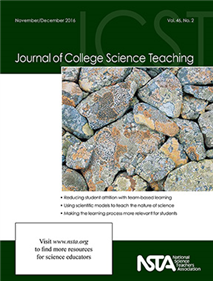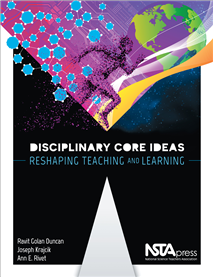All Resources
Journal Article
The author describes how she has incorporated mini-research proposals into her lab courses. Students use the data they collect during class experimen...
Journal Article
Using Citizen Science to Engage Preservice Elementary Educators in Scientific Fieldwork
Preservice elementary teachers’ lack of confidence in teaching science is an ongoing concern. Only 29% of elementary teachers in the field felt “v...
By Catherine M. Scott
Journal Article
Team-Based Learning Reduces Attrition in a First-Semester General Chemistry Course
Team-based learning (TBL) is an instructional method that has been shown to reduce attrition and increase student learning in a number of disciplines....
Journal Article
In the Midst of a Shift: Undergraduate STEM Education and “PBL” Enactment
In the engineering field, problem- and project-based learning, both of which are often referred to as PBL, are the dominant instructional models calle...
Journal Article
Through this case study, the authors offer insight into the value of using qualitative methods in course assessment to science instructors in higher e...
Journal Article
Three college faculty taught large general biology classes using case studies and personal response systems (clickers). Each instructor taught the sam...
Journal Article
The purpose of this study was to determine whether there is a difference in spatial visualization ability between college students in STEM (science, t...
Journal Article
Point of View: In Defense of the Lecture, Revisited
This column shares reflections or thoughtful opinions on issues of broad interest to the community. This month’s issue discusses the value of tradit...
Journal Article
State and national data suggest a strong correlation between student performance in STEM subjects and student socioeconomic status, race, and ethnicit...
Journal Article
This column provides original articles on innovations in case study teaching, assessment of the method, as well as case studies with teaching notes. I...
eBook
Disciplinary Core Ideas: Reshaping Teaching and Learning (e-book)
Like all enthusiastic teachers, you want your students to see the connections between important science concepts so they can grasp how the world works...
Book Chapter
Introduction to DCIs: What They Are and Why They Are Important
This chapter serves as an introduction to Disciplinary Core Ideas (DCIs). As a whole, DCIs help students build usable knowledge that is central to the...
Book Chapter
Core Idea PS1: Matter and Its Interactions
This chapter focuses on matter and its interactions and discusses the importance of how a rich understanding of atomic theory leads to a deeper unders...
Book Chapter
Core Idea PS2: Motion and Stability: Forces and Interactions
This chapter discusses the disciplinary core idea of forces and interactions which consists of three component ideas that are described here. If any i...



